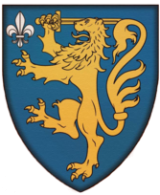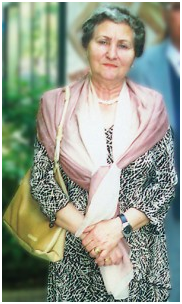50 years ago, on the 50th anniversary of the creation of the Albanian state, there were no celebrations like the 100th anniversary. Not even the names of the men who made this state were mentioned as much as today, when we learned about it from just about everyone. Isabela Toptani, the granddaughter of one of them, Murat, tells the story of the life of her grandfather, grandmother, Asie, what was known as the daughter of Naim Frasher and her father, the only oil engineer of those years.
None of us has escaped the “shouts of joy” of these days’ celebrations of the 100th anniversary of independence. Be it the good ones and the lesser ones. We presented (as never before) the story from the roots. Many were first introduced to the country’s 40 signatories of independence, some of whose descendants are, fortunately, still alive. One of them was Murat Toptani, Isabella’s grandfather, among the few who derived directly from his branch. Sherif Toptani, the father of Isabella and her sister Juzepina, was the second son of Murat and Asiyeh, the daughter of Naim Frashri. How was the life and education of the Toptanis around the world until they returned to their hometown of Tirana? Persecutions, marriages, and children who were educated in Europe’s best schools until they reached school age and until university. Isabella recalls what her father told her about her grandmother, grandfather and their lives in Kucova, where Sherif Toptani, the first oil engineer, worked his whole life after returning from Germany.
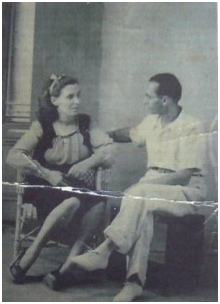
Sherif Toptani and his wife Italina
You seem to be one of the youngest direct descendants of Murat Toptani, you are his granddaughter…
Yes, my father, Sherif Toptani, was Murat’s second son. But since he did marry at a very young age, children too, I’m one of the “youngest”.
Do you mean at an older age…
My father was 43 when he married, and my mother 26. It was a very casual marriage.
Please tell us the story…
My name is Italian. He came to Albania in ’43 to work as a hairdresser in Korça, since their situation in Italy was very bad, they were very poor. The reason she chose Albania was that her fiancé was here with the Italian forces, which were being attacked by the Germans at the time. She had only a few months as a hairdresser, and brought equipment from Milan, when she found herself alone in the aviation field trying to return to Italy, at least to save her life. Attacks by the Germans continued and there was my uncle, who took him home to shelter him.
Even this is not that it was safe …
No it wasn’t, because the spies did their jobs. It is said that a fascist is housed in the Toptani house. They came to take him and in this very situation my father said that he was his wife, to save her. The marriage came later, after he saved her, she agreed to become his wife.
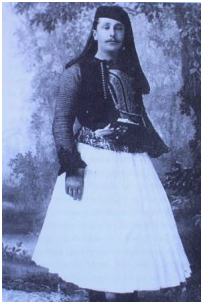
Murat Toptani wearing a national folk dress, photo Marubi, Shkodra 1896
In the case of your families, this is not something that can be done easily … The marriages of the Toptanis or other prominent people of the large families took place within the circle of the same estate. Did your father object to this point from family members?
It is true, until my father’s generation, marriages took place within large families, as happened to his brothers and himself. There had been an earlier affair with a daughter of the Vrlaci family, but had long been broken.
Your father was also born in Turkey, where was Murad’s family?
Yes. Murad was there with his father, Said, who, due to his activity, was interned in a remote area of the Caucasus. There he fathered two sons, Murat and Refik. There were also two daughters, Vesimena and Bageh. Murad married Asie, Naim Frasheri’s daughter.
Which activity?
Because of his political activity, he was arrested three times by the High Gate. He spent the last years of his life in the infamous Judukule Prison (White Tower) as a political prisoner.
When was he released?
When power in Turkey changed, sick and almost blind. He died shortly after his exile in Bey-Basar, Asia Minor, in 1882.
How did your grandfather Murat live? Where was he born?
Murat Toptani was born in July 1863 and died in February 1918. History recognizes him as a patriot, military, poet, publicist, painter and sculptor, skillful rider, teacher who worked hard to introduce and spread the Albanian language. in Turkish schools. He was fluent in several foreign languages.
He was born in Aka, (Caucasus) at the time of the exile of his father, Said. He began his studies at Istanbul’s Madam Fyras School, while continuing his studies at the Imperial College of Gallata Saraj, also in Istanbul. While attending classes at the French school of Madam Fyras, since his father was a friend of the Frashëri family, he lived in a house next to them, which they themselves had provided. His father’s education and contact during his schooling in Istanbul, conversations with the Frashëri brothers in their home played a major role in his formation.
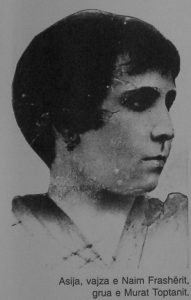
Asije Frashëri, daughter of Naim Frashërit
He then became the son-in-law of one of them, Naim?
While studying, he was accompanied by Asiye Frashëri, the girl who was in fact Sheriff Frasheri’s older brother, who later became his wife. Asya was orphaned and raised by her uncle, Naim, which is why she was widely known as Naim’s eldest daughter, or why they call Murat Bey Toptani as the great poet’s son-in-law. After 1895, Murat Toptani settled almost entirely in the city of Tirana, its origin. At home, she started organizing with friends in Tirana and beyond. On October 28, 1897, Murat Toptani was arrested by the High Gate. All the Albanian newspapers of the time, which, of course, went out of the Albanian lands, reported something important that had happened “in those days” in Albania.
How did the story of his prison go?
He was held for some time in Bitola, then exiled to Albania. At first in the Gallipoli of the Dardanelles and later in Tripoli, North Africa. By mid-1898, Murat, as Mit’had Frasheri writes, managed to escape from the prison of Tripoli, crossing the borders of the Ottoman Empire. Murat Bey Toptani moved from one city to another, in the Albanian colonies of Italy, where he continued to propagate the national cause. In October 1898 he was in Brussels and from there, together with Faik Konica, went to Bucharest. Murat Toptani is one of the few prominent Albanians, for whom he wrote, more than once, only good words Faik Konica. By the end of 1899, Murat returned to Albania but did not stay long because he was exiled until 1908 in Konya, in southeastern Turkey today. He supported the Kurbin uprising, led by Gin Peter Perviz, 1906-1912, with whom the Toptans had traditional friendships. Attended the Vlora Assembly, as a representative of Tirana, where appointed by Ismail Qemali placed the flag and delivered a speech on that occasion. His address, November 28, 1912, in Vlora, was also given by Mit’hat Frasheri and Baroness Marie Amelie Frein von Godin, both witnesses at the event.
Giuseppina and Isabella, daughters of Sherif Toptani, son of Murat Toptani
Back to your father, the Sherif, where did he go to school?
The whole first part of his life, until 1928, he was abroad, first in Turkey, in his early years of school, then in Austria and finally, at university in Germany.
All this to be returned to Albania?
Yes, he came and worked here at A.I.P.A, the oil extraction company. It was one of the few cadres to bear the technical and organizational burden of revamping the shipyard and the oil industry in all its branches.
What was it like living in Kucova?
Well first, they gave us good homes from the Italian buildings, then conditions deteriorated, less good homes, but not enough to feel persecuted, because the father’s job has always been good, despite not being appreciated and appreciated. nor is it highlighted enough. After the projects of his works were other names at the top. He was always thanked for his work in the stands, but never mentioned his name.
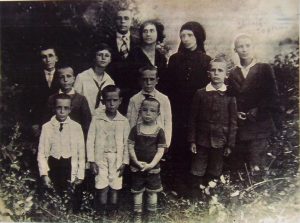
Asije Frashëri with children, 9 brothers and 2 sisters
Is the last name a stain, or…?
The fight against him had begun since the time of Kochi Xoxe, when he was assassinated twice, but not afterwards. I told you that, compared to others, we lived well. They even offered him positions in the ministry, but he always wanted to be where he was. Politics has not been in his interests.
I’ve seen some pictures of him with Enver Hoxha…
They always met on labor issues. Whenever Enver came to Kucova, he would definitely meet him, but my father would often go to Tirana when they needed to discuss further.
So the relationship with the “big one” was correct, even though you were still living in Kucova?
Yeah, I’ve never heard anything different. My mother often complained, pushing her to be more involved, even politically, to at least recognize her merits and lead a better life. But perhaps because of his type, even though his work was built there, we continued to live in Kucova.
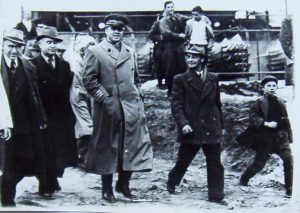
Sherif Toptani and Enver Hoxha
Of course my mother would insist. She was alone in a foreign country…
It has been more difficult for him. People were talking, calling him fascist, mistreating him in the queue or not feeling well in different situations.
Did she learn Albanian fast?
For daily communication yes, but she started learning more just when my sister went to first grade. He studied with her.
Did she have contact with her people?
We would send and receive letters, send us packages, sweets. I remember the pallets or clothes that were brought to us at that time. Of course everything was open and controlled before, but they generally came. It went to its people only twice before the ’90s and those times were made possible because there were guarantors involved in politics who, before leaving, never forgot to say, “Remember that you have four kids here. “
Did you, the children, feel treated differently from your social circle?
The surname of our family is very wide, so sometimes you had to keep things that didn’t belong to you. The Toptans identified with Esat Pasha, which grandfather, Murad, had no connection with, even had completely opposite ideas. When we did East’s story at school, we all looked weird. Of course we were children, we didn’t understand and feel bad, later things changed. I can tell you that Murat Esati’s house burnt down twice. The latter has been with the theories of the East, while the Western Murata. And yet, we were always “sung” by Esat’s song. In addition, we were the children of an Italian, so we were stigmatized twice.
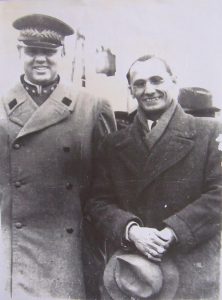
Sherif Toptani and Enver Hoxha
How was life in later years…
My father died before 1970, we children were educated and married, both in Kuçova and in Tirana. The mother continued to live there with the brothers. After the ’90s, of course we were also provided with Italian documents from her.
Written by: ANI JAUPAJ
